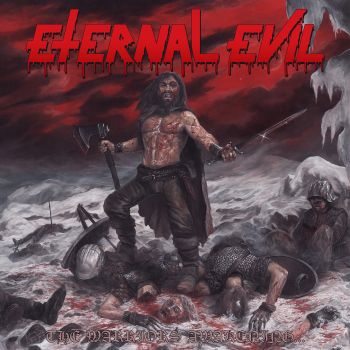Eternal Evil - Official Website
The Warriors Awakening Brings The Unholy Slaughter |
Sweden
 |
|---|

Review by Felix on February 7, 2022.
Hopefully it’s a common understanding that thrash metal sounds much better than its artworks indicate. The one of Eternal Evil’s debut looks like “Endless Pain 2.0” and it seems that many so-called artists have a lot of violent – and childish – fantasies. But, as said, the content is better than the cover. Much better, to say the truth, and much more mature than Mille and Ventor back in 1985. But apart from the remarkably mature performance, the newcomers from Sweden have released a typical debut.
No doubt, these gentlemen have not previously found an outlet for their youthful aggression – and now they are on a mission. Therefore, variety is written in small letters and an ironic distance to their own actions is completely missing. But that doesn't matter. With a thousand bumblebees in their asses, these heralds of the old school know only one direction: straight ahead with high velocity. They have adopted the charm of Demolition Hammer’s “Epidemic Of Violence” and early Kreator are more than just a visual influence. It's so fierce that during a longer mid-tempo part like in 'Terror Of The Sphinx' you almost fear that the record has switched itself from 33 to 16 rpm. But thanks to the dubious god of progress, this option can be ruled out in our digital times.
Of course, thrash metal without energy is no thrash metal at all. Nevertheless, the here presented level of destruction is remarkable. Eternal Evil make their way regardless of all barriers and the fact that there is actually no path at all where they seek their way through the thicket. But the riffs (100% old school audited), the rabidly barking vocalist and the human drum machine create a result that makes us forget their one-dimensional approach. It’s not only the rolling riff of 'The Nocturnal Omen' that draws the listener into the song immediately. And it’s more than the almost melodic (don’t take this word too seriously in the context of The Warriors Awakening…) chorus of 'Terror Of The Sphinx' that gives me the warm feeling I have bought this disc for good reasons.
But perhaps I should not mention single titles, because Eternal Evil manage to keep a high quality level from the beginning to the end. The bone-breaking shredding of the quartet is simply impressive and much more effective than it was on their demo. And so The Warrior’s Awakening… belongs to these works where your favourite song changes from day to day. So if you don't fear clichés, high speed and self-limitation, “Reign In Blood” inspired solos and more or less monotonous barking of the lead vocalist, you can get a lot out of this debut for yourself, even if 'Rise Of Death' lets the title track of "Pleasure To Kill" shine through very clearly in parts.
Rating: 8.4 out of 10
976